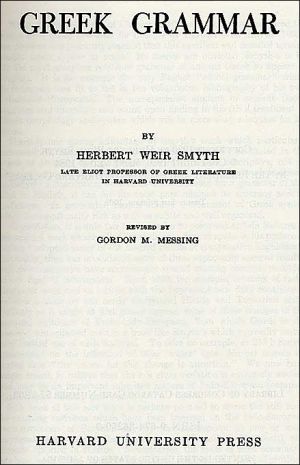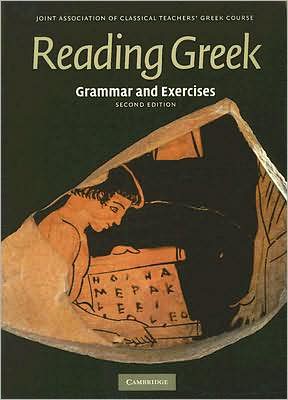Greek Grammar
Professor H. W. Smyth's classic text on Greek Grammar -- yet to be improved on.
Search in google:
Professor H. W. Smyth's classic text on Greek Grammar -- yet to be improved on.
IntroductionThe Greek Language and its DialectsAdvanced Works on Grammar and DialectsAbbreviationsPart I: Letters, Sounds, Syllables, AccentThe AlphabetVowels and DiphthongsBreathings Consonants and their DivisionsPronunciationVowel ChangeEuphony of VowelsHiatus ContractionSynizesisCrasisElisionAphaeresisEuphony of ConsonantsFinal Consonants Movable Consonants Syllables, and their QuantityAccent: General PrinciplesAccent as affected by Contraction, Crasis, ElisionChange of Accent in Declension, Inflection, and CompositionProclitics and EncliticsMarks of Punctuation Part II: InflectionParts of Speech, Stems, RootsDeclensionNumber, Gender, CasesRules for Accent of Nouns, Case Endings of NounsDeclension of SubstantivesFirst DeclensionSecond DeclensionThird Declension (Consonant Stems) Formation of Cases and Stems, GenderLabial Stems Dental Stems Liquid StemsStems in SigmaStemsCasesIrregular DeclensionDeclension of AdjectivesFirst and Second DeclensionsThird Declension Consonant and Vowel Declension CombinedIrregular DeclensionComparison of AdjectivesDeclension of PronounsPersonal PronounsIntensive PronounReflexive Pronouns, Possessive PronounsReciprocal Pronoun, Definite Article, Demonstrative PronounsInterrogative and Indefinite PronounsRelative Pronouns Correlative Pronouns Adverbs: Origin, Comparison, Correlative AdverbsNumeralsVerbsVoices, Moods, Verbal Nouns, TensesNumber, Person, Tense-stemsPrincipal Parts, Verb-stems Inflection, MI Inflection, Thematic Vowel. ParadigmsVowel Verbs: Synopsis and Conjugation Vowel Verbs ContractedConsonant Verbs Accent of VerbsAugmentReduplicationTense-suffixes, Thematic VowelMood-suffixesPersonal Endings Formation of Tense-systems Changes in the Verb-stemPresent and Imperfect First Class (Simple Class) Second Class (Tan Class) Third Class (Iota Class) Fourth ClassFifth Class Sixth Class (Mixed Class) Future, Active and Middle First Aorist, Active and Middle Second Aorist, Active and MiddleFirst Perfect and Pluperfect, ActiveSecond Perfect and Pluperfect, Active Perfect, Pluperfect, Future Perfect, Middle First Passive (First Aorist and First Future) Second Passive (Second Aorist and Second Future) Periphrastic FormsFirst Conjugation or VerbsVowel VerbsLiquid Verbs, Stop VerbsInflection of VerbsPresent and Imperfect, Active and MiddleContract VerbsFuture Active and Middle, Future PerfectFuture PassiveFirst Aorist, Active and MiddleFirst and Second Aorist PassiveSecond Aorist, Active and MiddleFirst and Second Perfect and Pluperfect, ActivePerfect and Pluperfect, MiddleSecond Conjugation or Verbs in MIPresent System; First or Simple ClassFourth Class Inflection of MI-Verbs Present and Imperfect Futures, First Aorist, Second AoristFirst and Second Perfect and Pluperfect, Active, Perfect MiddleIrregular MI-VerbsPeculiarities in the Use of Voice-forms Future Middle with Active MeaningMiddle Deponents, Passive Deponents Deponents with Passive Meaning Active Verbs with Aorist Passive in a Middle SenseMixture of Transitive and Intransitive SensesPart III: Formation of WordsPrimary and Secondary StemsPrimitive and Denominative WordsSuffixesChanges in StemsFormation of Substantives Formation of AdjectivesList of Noun Suffixes Denominative Verbs First Part of a Compound Last Part of a CompoundAccent of Compounds, Meaning of CompoundsPart IV: SyntaxSentences, Subject, PredicateSyntax of the Simple SentenceSubject a Substantive or an EquivalentPredicate Nouns, Attributive AdjectiveAppositive, Copula, ObjectExpansion of Subject and PredicateThe ConcordsThe Subject Its Omission Impersonal Verbs, Subject of the InfinitiveCase of the Subject the NominativeThe PredicateOmission of the VerbConcord of Subject and PredicateWith One SubjectWith Two or More Subjects Concord of Predicate SubstantivesApposition Peculiarities in the Use of Number, Gender, PersonAdjectives Attributive Adjectives: their AgreementPredicate Adjectives: their AgreementAttraction of Predicate NounsComparison of Adjectives (and Adverbs) AdverbsThe Article PronounsPersonal PronounsPossessive PronounsThe PronounReflexive PronounsDemonstrative PronounsInterrogative Pronouns Indefinite PronounsThe CasesVocativeGenitiveGenitive Proper with NounsGenitive of Possession Genitive of the Divided Whole (Partitive) Genitive of QualityGenitive of ExplanationGenitive of Material, MeasureGenitive, Subjective and ObjectiveGenitive of ValueGenitive Proper with VerbsPartitive GenitiveGenitive of Price and ValueGenitive of Crime and AccountabilityGenitive of ConnectionGenitive with Compound VerbsGenitive Proper: Free UsesAblatival Genitive with VerbsGenitive of Separation Genitive of Distinction, ComparisonGenitive of CauseGenitive of SourceGenitive with AdjectivesGenitive With Adverbs Genitive of Time and PlaceDativeDative ProperDative Dependent on a Single WordDirect ComplementIndirect ComplementDirector Indirect ComplementDative as a Modifier of the SentenceDative of InterestDative of RelationDative with Adjectives, Adverbs, SubstantivesInstrumental DativeInstrumental Dative ProperComitative DativeWith Adjectives, Adverbs, SubstantivesLocative Dative Dative with Compound VerbsAccusativeAccusative of Internal Object (Object Effected) Accusative of External Object (Object Affected) Free Uses of the AccusativeAccusative of RespectAdverbial AccusativeTwo Accusatives with One VerbTwo Verbs with a Common ObjectThe PrepositionsOrigin and DevelopmentVariationRepetition and OmissionOrdinary UsesList of PrepositionsImproper PrepositionsThe VerbThe VoicesActive VoiceMiddle VoicePassive VoiceThe Moods The ParticleThe Moods in Simple SentencesThe TensesKind of Time, Stage of ActionTenses outside of the IndicativeTenses of the IndicativePresentImperfectFutureAoristPerfectPluperfectFuture PerfectPeriphrastic TensesThe InfinitiveSubject and Predicate Noun with InfinitivePersonal and Impersonal ConstructionInfinitive without the ArticleAs Subject, Predicate, and AppositiveNot in Indirect DiscourseAfter Verbs of will or desireAfter Other VerbsAfter Adjectives, Adverbs, and Substantives Infinitive of Purpose and ResultAbsolute Infinitive Infinitive in Commands, Wishes, and ExclamationsIn Indirect DiscourseInfinitive with the ArticleTHE PARTICIPLEAttributive Participle Circumstantial ParticipleGenitive AbsoluteAccusative AbsoluteAdverbs used in Connection with Circumstantial ParticiplesSupplementary ParticipleNot in Indirect DiscourseIn Indirect DiscourseOmissionParticiple in Indirect DiscourseVerbs taking either the Participle or the InfinitiveRemarks on Some Uses of ParticiplesVerbal AdjectivesPersonal and Impersonal ConstructionsSummary of the Forms of Simple SentencesSyntax of the Compound SentenceAsyndetonCoordination in Place of Subordination—ParataxisSyntax of the Complex SentenceGeneral ViewAnticipation (or Prolepsis) Assimilation of MoodsThree Main Classes of Subordinate ClausesPurpose Clauses (Final Clauses)Equivalents of a Final ClauseObject ClausesConnection of Final with Object ClausesObject Clauses with Verbs of EffortObject Clauses with Verbs of CautionObject Clauses with Verbs of FearingCausal ClausesResult Clauses (Consecutive Clauses)with the Infinitivewith a Finite VerbProviso ClausesConditional ClausesClassificationTable of Conditional FormsPresent and Past ConditionsSimple Present and Past ConditionsPresent and Past Unreal ConditionsUnreal ConditionsFuture ConditionsMore Vivid Future ConditionsEmotional Future ConditionsLess Vivid Future ConditionsGeneral ConditionsPresent General Conditions Past General Conditions Indicative Form of General ConditionsDifferent Forms of Conditional Sentences in the Same SentenceVariations from the Ordinary Forms and Meanings of Conditional SentencesModifications of the ProtasisModifications of the ApodosisProtasis and Apodosis CombinedLess Usual Combinations of Complete Protasis and ApodosisTwo or More Protases or Apodoses in One SentenceConcessive ClausesTemporal ClausesIndicative Temporal Clauses referring to Present Or Past TimeTemporal Clauses referring to the FutureTemporal Clauses in Generic SentencesTemporal Clauses denoting PurposeSummary of the Constructions of so long as and untilGeneral RuleComparative ClausesSimiles and ComparisonsRelative ClausesRelative PronounsConcord of Relative PronounsThe Antecedent of Relative ClausesDefinite and Indefinite AntecedentOmission of the AntecedentRelative not RepeatedAttraction of Relative PronounsCase of the Relative with Omitted AntecedentInverse Attraction of Relative PronounsIncorporation of the AntecedentOther Peculiarities of Relative ClausesUse of the Moods in Relative ClausesClasses of Relative ClausesOrdinary Relative ClausesRelative Clauses of PurposeRelative Clauses of CauseRelative Clauses of ResultConditional Relative ClausesLess Usual FormsDependent Substantive ClausesDependent StatementsIndirect DiscourseGeneral PrinciplesSimple Sentences in Indirect DiscourseComplex Sentences in Indirect DiscourseImplied Indirect DiscourseRemarks on the Constructions of Indirect DiscourseInterrogative SentencesDirect QuestionsIndirect QuestionsExclamatory SentencesDirect Exclamatory SentencesIndirect Exclamatory SentencesNegative SentencesDifferences between wordsPositionsAdherescentIndicative and OptativeSubjunctive and ImperativeNegatives of Indirect DiscourseInfinitiveNot in Indirect DiscourseIn Indirect DiscourseParticipleSubstantives and Adjectives used SubstantivelyApparent Exchange Infinitive depending on Verbs of Negative MeaningInfinitive depending on Negatived VerbsParticiple depending on Negatived VerbsSubjunctive and IndicativeRedundantNegatives and the InfinitiveAccumulation of NegativesSome Negative PhrasesParticlesGeneral ViewList of Particles FiguresList of Grammatical and Rhetorical FiguresAppendix: List of VerbsEnglish IndexGreek Index







